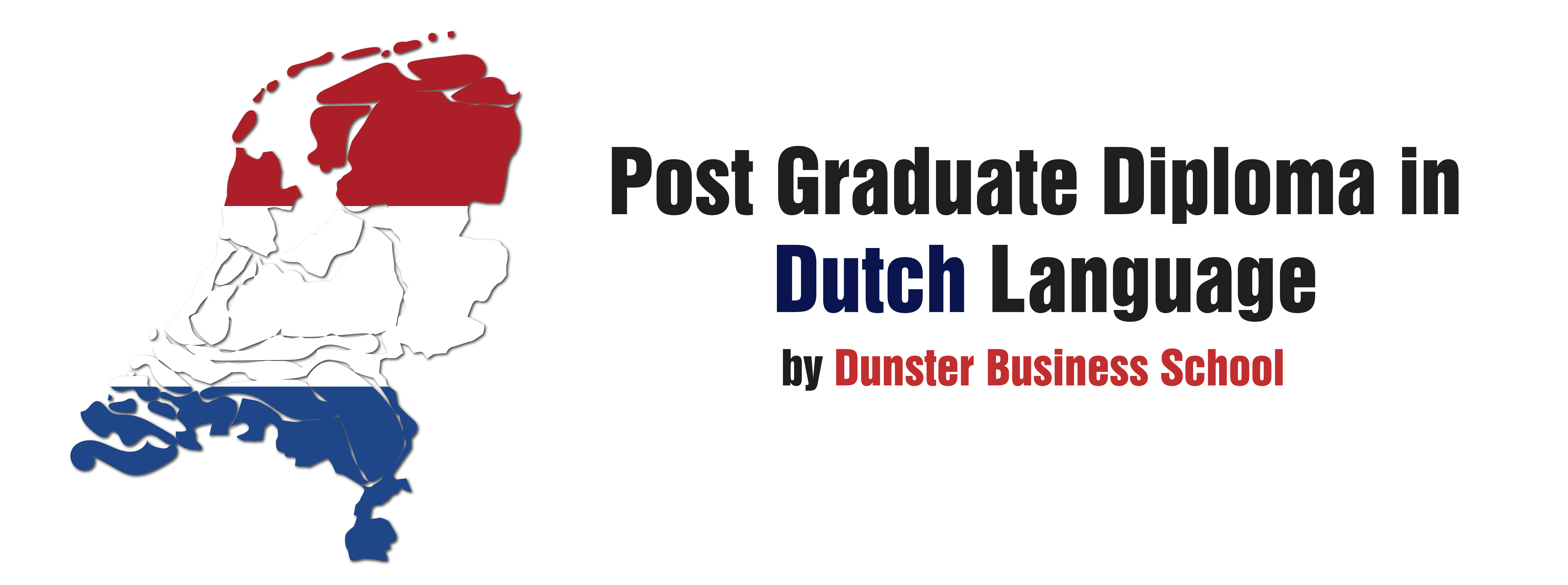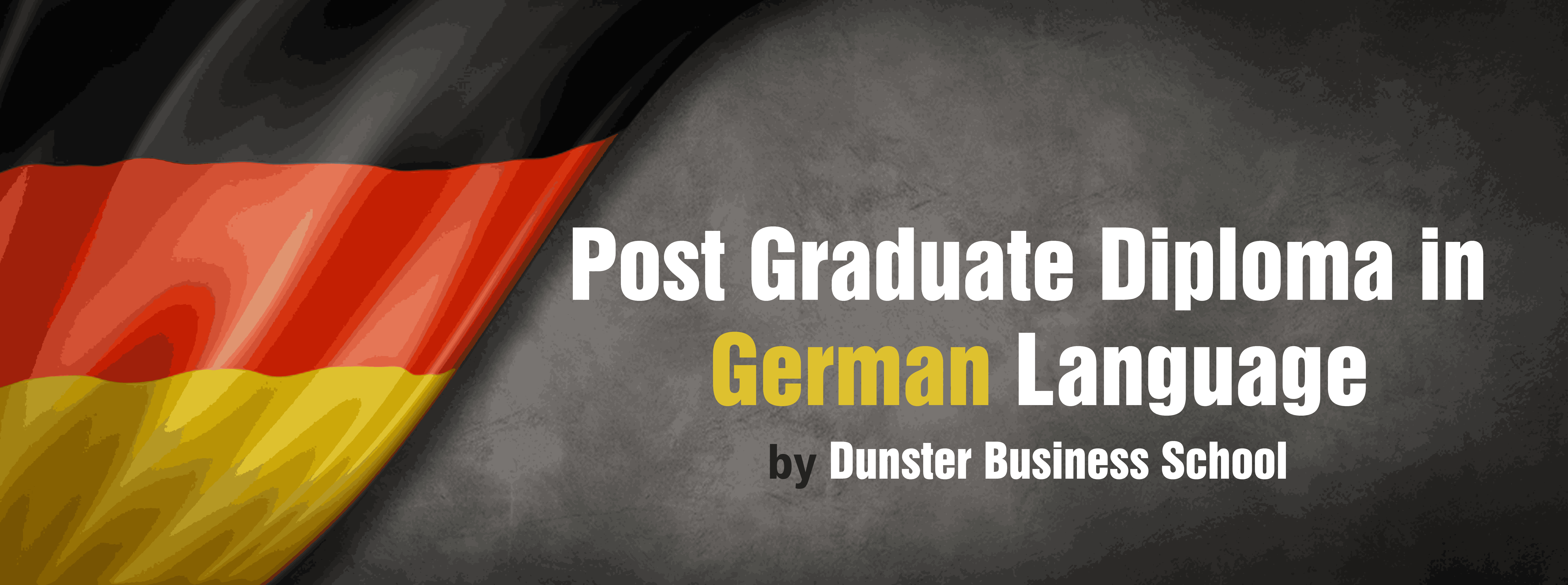Post Graduate Diploma in Dutch Language by Dunster Business
Learn Dutch Language from experts | Learn advanced grammar, sentence structure, and vocabulary | Speake native level Dutch | Ace Dutch Language Proficiency Exams.
Awarding Institution : Dunster Business School Switzerland
Eduwatts Role : Admission Partner
Assessment Requirement : Yes by Dunster Business School Switzerland

Total Course Duration
244 + Hours

Course Fee
INR 91000
INR 75000

Next Batch Starts
23-Feb-2026

Certification
Yes*
Live Zoom Call with a Learning Consultant (FREE)
Book a Live Class, For Free!
What you will learn at Eduwatts
Emphasize on complex grammatical structures and vocabulary with idiomatic expression
Gain high advanced proficiency in Dutch language
Create a cultural background of Dutch culture, history, and social norms to provide language use in authentic life situations
Cover business, law, tourism, and academic language
Master experiential speaking, listening, reading, and writing through authentic sessions, role-playing, and interactive workshops
Be able to research or write a thesis in the Dutch linguistics, literature, or culture area with professionals as guidance

Disclosures
This program is supported and facilitated by Eduwatts.
The certificate/degree (if applicable) is awarded solely by Dunster Business School Switzerland, subject to eligibility and successful completion of assessments.

Who is this course for?
-
Language enthusiasts who want to master Dutch
-
Professionals seeking to acquire Dutch language proficiency to work
-
Anyone who is moving to Dutch speaking regions
-
Students who aim to pursue higher education
-
Researchers who specialize in the field of Dutch linguistics or literature

Syllabus
-
Module 1: Dutch A1 Level
- Functional Content
- Say hello and goodbye.
- Introducing someone and reacting to being introduced. (Meet people).
- Ask for forgiveness.
- Give the thanks.
- Point out that it is not understood.
- Ask someone to speak more slowly or louder.
- Request a repetition of what was said.
- Spell out and request to be spelled.
- Request that something is written.
- Identify people, places, and objects.
- Describe people, places, and objects.
- Refer to current or habitual actions.
- Refer to plans and projects.
- Express agreement and disagreement.
- Express knowledge or ignorance.
- Express and ask if it is possible or not to do something.
- Express and ask for desire and need.
- Invite and offer something. Accept or decline invitations and offers.
- Start and end the speech
- Cultural Content
- Ways of greeting and presentation
- Use of the language in various social situations
- Grammar
- Basic phrases (greetings, farewells).
- Important Commands for the class.
- Basic questions (what, how, which, all questions).
- Survival phrases, invitations, requests, etc.
- Alphabet. Basic concepts of pronunciation and intonation.
- The noun. The adjective. The concordance. Articles.
- Days of the week, months, and seasons of the year.
- The numbers.
- Pronouns.
- Adverbs of place.
- Basic prepositions of place.
- Verb do (depends on the student, you can go before).
- Regular present.
- Present Irregular (more frequent).
- Uses of knowing and knowing.
- Some modal verbs: power, want, have to.
- Most frequent reflexive verbs.
- Verbs like.
- Basic conditional.
- Past Indefinite, the most frequent regular and irregular verbs
- Skill Work
- Lots of speaking/(inter) active practice
- Spelling
- Lots of listening (dialogues)
- Pronunciation
- Exercises and Language-Learning activities, such as role-plays
- Functional Content
-
Module 2: Dutch A2 Level
- Functional Content
- Compare people, objects, places, and situations.
- Express and ask for opinions about something or someone.
- Express and ask about the degree of security.
- Express and ask for the obligation to do something.
- Ask, grant, and deny permission.
- Express and ask for satisfaction and desire
- Express and ask for preferences.
- Express and ask for needs.
- Express and ask about physical sensations and pain.
- Suggest activities and react to suggestions.
- React to a story with expressions of surprise, interest, joy.
- To congratulate you.
- Address someone.
- Relate elements and parts of speech.
- Verify that what has been said has been understood.
- Asking for a word or expression that is unknown or has been forgotten.
- Express and ask for desire and need
- Invite and offer something. Accept or decline invitations and offers.
- Start and end the speech
- Cultural Content
- Social codes: invite, offer, reject.
- Social behaviors when giving and receiving gifts in countries.
- The importance of meals in family and social relationships.
- Grammar
- General review of the contents of A1.
- Extension of the irregular program A1.
- Extension of modal verbs.
- Other verbs like ""LIKE"": hurt, annoy, seem.
- Imperfect Past (regular and irregular)
- The general alternation between Preterite Indefinite and Imperfect.
- Future of Indicative.
- The 1st conditional: Yes + Present + Future.
- Some modal verbs: power, duty, have to.
- Direct and indirect object. Pronoun placement.
- Regular Imperative You and You
- Functional Content
-
Module 3: Dutch B1 Level
- Topics and Vocabulary
- Conversation about present, future & past events, and describing a situation
- Explaining habitual actions
- Talking about memories
- Making Comparisons
- Explaining anecdotes
- Expressing feelings such as happiness, pity, surprise, fear
- Expressing how long you have been doing an action for
- Sentence and word building
- Describe feeling
- Express Present Wishes and Future Wishes
- Express Problems and give advice
- How to give order and instructions
- Passing messages
- Reported speech
- Grammar
- Imperfect tense
- Past simple vs. Imperfect past
- Prepositions
- Different clause types
- Present subjunctive
- Imperative
- Conditional tense
- Pronouns and prepositions
- Different clause types
- Cultural Content
- Literature overview
- Vocabulary words differently in different countries
- Different indigenous peoples and their customs and habits
- Variety of food in all the speaking countries
- Aspects of Personality and habits
- Skill Work
- Talking and active practice
- Listening practice
- Pronunciation
- Reading and Writing
- Topics and Vocabulary
-
Module 4: Dutch B2 Level
- Topics and Vocabulary
- Express opinion and argue with people
- Talk and describe past events
- Express doubts and probability
- Give opinions and recommend films
- Complain about things and situations
- Demand things
- Use gesture to communicate
- Ask for advice and react to advice
- Make a hypothesis about past events and explain it
- Make a hypothesis about future
- Grammar
- Revision of present subjunctive tense, conditional tense, imperative tense, and all past tenses.
- Uses of all past tenses
- Direct and indirect pronouns
- Future tense
- Expresion to use when you argue like: me molesta que…,no soporto que…, me sorprende que..
- Present, past perfect, and past imperfect subjunctive.
- Second conditional sentences.
- Future simple.
- Conditional simple y compuesto.
- Revision of imperative tense affirmative and negative.
- Pronouns, prepositions.
- Different clause types
- Cultural Content
- Telling jokes
- Idioms
- Introduction to poetry
- Arts and Literature and music
- How is life in modern cities in Latin America
- Slang vocabulary and expressions
- Skill Work
- Active oral practice
- Listening
- Debates
- Accents
- Reading and some Writing
- Topics and Vocabulary

What's Included?
244 Hours of Interactive, Real-Time Training
Unlimited 24/7 Access to Our E-Learning Portal
Learn from Industry Experts
AI powered Auto- Graded Exercises
Vocabulary Flashcards
Hands-On Internship Experience
Exclusive Access to Our Premium Job Portal
Globally Recognized Professional Certification
Credits and Swiss Certification from Dunster Business School, Switzerland
Sample Course Certificate


Course Description
The Postgraduate program in Dutch Language course-in-depth, wherein students are prepared with deep linguistic skills, culture consciousness, and practice in the expression of themselves fluently in Dutch. It caters extremely well for those wanting professional fluency in Dutch to support academic, business, or professional purposes. Immersive studies of the language along with cultural understanding ensure that it is not just the language that the learner masters but also the nature of Dutch-speaking communities.

Frequently Asked Questions
-
Are all the levels included in this PGD course?
Yes, All the levels from A1 to B2 are included comprehensively in this Post Graduate Diploma course.
-
Is there a career path after taking this course?
Yes, as a translator or interpreter, a language teacher, or even in international business, diplomacy, or media.
-
Is it suitable for a beginner in Dutch?
Most postgraduate courses require an intermediate or advanced level clearance, so if you are an absolute beginner, it is highly recommended that you finish up a beginner's course or find out whether the program at hand contains foundational language modules.
-
Will this course prepare me for language proficiency exams?
Yes, the PGD course definitely prepare the students for the intermediate levels of the Dutch Language Proficiency Examinations. Thus, it enhances your qualification.

Related Courses

Post Graduate Diploma in Mandarin Language by Dunster Business School
Level: Advanced
Course Fee: INR 106000 + 18% GST

Post Graduate Diploma in Spanish Language by Dunster Business School
Level: Advanced
Course Fee: INR 54500 + 18% GST

Post Graduate Diploma in German Language by Dunster Business School
Level: Advanced
Course Fee: INR 54500 + 18% GST
.webp)
.webp)









